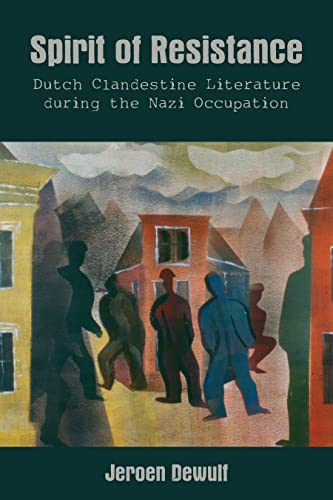
Spirit of Resistance
by Jeroen Dewulf
"Dutch Clandestine Literature During the Nazi Occupation"
Popularity
0 / 5
* A book's popularity is determined by how it compares to all other books on this website.
Where to buy?
Buy from Amazon* If you buy this book through the link above, we may receive a small commission at no extra cost to you.
Spirit of Resistance by Jeroen Dewulf
Details
War:
World War II
True Story:
Yes
Biography:
No
Region:
Europe
Page Count:
302
Published Date:
2010
ISBN13:
9781571134936
Description
Main Themes and Topics
Spirit of Resistance by Jeroen Dewulf delves into the fascinating world of clandestine literature in the Netherlands during the Nazi occupation. The book explores the dual nature of resistance and complicity within Dutch society, noting how clandestine literature became a means of cultural defiance. Dewulf addresses the complex dynamics between Dutch and German identities, particularly how clandestine writings resisted German propaganda and challenged the notion of a shared "Germanic" heritage. The book also confronts the harsh realities of the Holocaust in the Netherlands, acknowledging the troubling paradox of cultural resistance amidst widespread compliance with Nazi deportation policies.
Writing Style and Tone
Dewulf's writing is both scholarly and accessible, making complex historical events understandable and engaging for readers. His tone is analytical yet empathetic, providing a nuanced examination of Dutch clandestine literature without shying away from the difficult moral questions it raises. Dewulf integrates historical facts with literary analysis, ensuring that his narrative is both informative and thought-provoking. This careful balance allows readers to appreciate the significance of clandestine literature while reflecting on the broader ethical implications.
Awards and Recognition
While specific awards for Spirit of Resistance are not noted in the provided information, Jeroen Dewulf's role as the Queen Beatrix Professor of Dutch Studies at the University of California, Berkeley, highlights his academic authority and expertise in the subject matter. It suggests that his work is well respected in academic and literary circles, further supported by the thoroughness and depth of analysis presented in the book.
Criticism
The scope of Spirit of Resistance may not cover every aspect of the vast topic of Dutch clandestine literature, possibly leaving some readers wanting more detail on specific works or authors within the movement. Some readers might also find the moral complexities discussed in the book challenging, as Dewulf does not offer simple resolutions to the ethical questions raised by the historical context.
Brief Summary
Jeroen Dewulf's Spirit of Resistance offers a comprehensive examination of Dutch clandestine literature during the Nazi occupation. It uncovers the multifaceted nature of Dutch resistance, examining how literature became a conduit for defiance against German occupation and propaganda. Despite this cultural resistance, the book does not shy away from revealing the darker side of Dutch history, particularly in relation to the Holocaust. Dewulf's work offers valuable insights into the paradoxes of resistance and compliance within occupied Netherlands, making it an essential read for those interested in World War II history, literature, and ethics.









